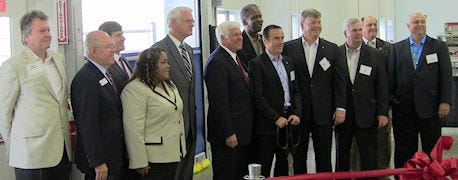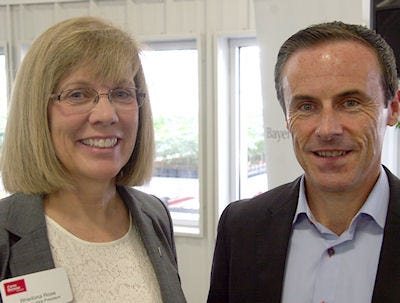September 10, 2014

By Forrest Laws
Cotton has come a long way at the Memphis, Tenn., Agricenter International, but there's more innovation to come as Bayer CropScience on Sept. 4 unveiled its $17 million state-of-the-art greenhouse facility on the eastern end of the complex.
The 76,000-square-foot facility will allow Bayer CropScience researchers to test even more cotton traits and varieties than they could at the older Stoneville greenhouses at the Agricenter. The key, according to Al Balducci, global cotton traits intogression manager and site manager for Bayer CropScience, is automation.

Liam Condon, center, is joined by Bayer CropScience officials and political and economic leaders from Shelby County and the state of Tennessee for the ribbon cutting at Bayer CropScience's new fully automated greenhouse in Memphis on Sept. 4. Shelby County owns the Agricenter International.
"That automation allows us to significantly increase the total number of seedlings that we can grow per square foot of greenhouse space," Dr. Balducci said. "That engineering or expertise is brought to us by a team not in the United States but in other parts of the world so that we can bring that kind of innovation to our facility here.
"By being able to grow more seedlings that allows us to do more research on traits and technologies now and in the future," he noted. "That's as simple as I can make it – it's a numbers game."
Bayer CropScience currently performs all of its cotton trait intogression work for North America at the Memphis facility. The site also provides trait intogression support for the Bayer CropScience seed business in South America and Africa.
The expansion of the greenhouse site also included a new cotton and soybean phytopathology lab and also will include work on soybean breeding and management, soybean pathology, molecular breeding programs and stewardship management.

Rhedona Rose, left, executive vice president of the Tennessee Farm Bureau, and Liam Condon, CEO of Bayer CropScience and chairman of the board of management of Bayer CropScience AG, attend the greenhouse ribbon cutting ceremony Sept. 4 in Memphis.
Part of $7 billion plan
The new facility is part of Bayer's commitment to invest more than $7 billion in research and development and capital expenditures and expand production capacities and seed breeding facilities globally between 2011 and 2016, company officials said.
"Driving innovation requires giving our scientists world-class facilities and tools," said Mike Gilbert, head of global breeding and trait development for Bayer CropScience. "Our greenhouse is unique in its scale and global scope, and will help Bayer CropScience better serve growers by giving them more choices for improving their crop quality and yield."
Continue reading after the jump >>
~~~PAGE_BREAK_HERE~~~
Jim Blome, president and CEO of Bayer CropScience LP, said the facility is also about investment in Memphis.
"Our new Memphis facility is part of a commitment to the greater Memphis area, and it is from this base that we seek to continue our local economic impact as well as thought leadership on global agriculture and bioscience issues," he said.
The design of the new facility helps Bayer CropScience reduce its environmental footprint by allowing the company to meet its research needs with less greenhouse space, Balducci says. Space that would normally be devoted to aisles between the test benches is eliminated in the floor plan.
"We've also moved a lot of the technical work of handling and processing our breeding projects into an air conditioned work space in our headhouse area," Balducci says. "So we have improved the actual working conditions for all of our staff who used to have to labor in our greenhouses, which are very hot and humid spaces."
Focus on efficiency
As cotton farmers know, cotton prefers that the thermostat be set higher than most humans prefer.
"Cotton is really a crop that likes the desert, it likes heat, it likes sun," Balducci says. "These kinds of conditions can be mimicked using our greenhouse control system. All of these facilities can be put to bear here. We've built it not only for cotton, but especially for cotton."
The design means fewer materials were used in construction. Features include an approximate 40% reduction annually in natural gas and electricity consumption. Additionally, the facility will include sensor detecting light fixtures, high efficiency greenhouse lights with longer-lasting ballasts, recycled greenhouse water to irrigate seedlings, as well as hands-free plumbing fixtures.
Visit Bayer CropScience's website for more information on the Memphis greenhouse site.
Laws is Content Director for Farm Press, a sister publication to Farm Progress and Farm Futures magazines.
You May Also Like




